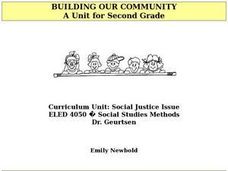National Endowment for the Humanities
Revolution '67, Lesson 1: Protest: Why and How
To some people, protesting is as American as apple pie, but the factors that lead to protests can be as confusing to veteran activists as to today's youth. Revolution '67 explores the riots in Newark, New Jersey as a case study. ...
Curated OER
Progression of Political Movements
Students examine the various political parties throughout history. In groups, they are given documents identifying the platforms of the parties in the 1868 election. To end the lesson, they share their information with the class and...
Facing History and Ourselves
Laws and the National Community
When it comes to the law, is justice always served? Teach scholars about how law sometimes enables prejudice of entire groups of people with a unit on World War II that includes a warm-up activity, analysis of primary sources,...
Curated OER
"The Election"
Students participate in an election for the purpose of comprehending the political process and the responsibilities that come with citizenship in a free society. They elect officials with no identity and are surprised with the revealing...
Curated OER
"History of My Family"
Young scholars explore world geography by participating in a family history project. In this U.S.S.R. instructional activity, students read assigned text regarding the Stalinist era of Russia and the intolerance that thrived there. Young...
Curated OER
In His Own Words: James Madison On the Problem of Faction
Students are introduced to the writings of James Madison and explain why he is often called "The Father of the Constitution". Using primary source documents, they examine his view of the Bill of Rights and what he meant by faction. In...
Curated OER
Peace and Aggression: A Challenge of Our Time
Students examine the arguments for and against the United States involvement in the Vietnam War. In groups, they must assign the Vietnam War a just or unjust war using the techniques used to fight and the reasons used by the government...
Curated OER
Why Do We Suffer From The Rights Of Others?
Students examine how diversity within populations has caused problems. In groups, they develop their own definitions of racism and discrimination. They participate in role-plays in which they gather the appropriate techniques to deal...
Curated OER
Respect for Authority
Students examine the country of Mongolia and how it is trying to form a democracy. As a class, they participate in a class meeting about a new class rule and they voice their opinions. They read excerpts of a letter of a Peace Corps...
Curated OER
Enemy or Ally: America's Response to the Russian Revolution
Students examine the events related to the Russian Revolution. In groups, they use the internet to discover the concerns of Woodrow Wilson during this time period and relate them to the origins of the Cold War. To end the lesson, they...
Curated OER
Hitler's Fatal Gamble
Students consider the differences between totalitarianism and democracy. For this comparative politics lesson, students will read a handout describing the major components that comprise totalitarianism and democracy, then they will...
Curated OER
Safe Cyberpals
Students compare cyberpals and face to face friends. They explain that a cyberpal is still a stranger. They recall that private information should not be given to anyone in cyberspace without permission of a parent of teacher. Students...
Curated OER
Bill of Rights -- Texas v. Johnson, 1989
Students examine the First Amendment of the Bill of Rights. During a visit to the George Bush Presidential Museum, they watch a video about the Texas v. Johnson flag burning case. In groups, they discover the role of the Supreme Court...
Curated OER
Building Our Community
Second graders examine the different relationships within communities. They discover the need for rules and organization. They identify their role in the local community as well.
Curated OER
Long-Term Goals
Students set long-term and short-term goals. In this character education lesson, students determine whether goals that they write for themselves are long-term or short-term.
Curated OER
Michigan Court System (Part 1) (Middle School)
Students identify the courts that make up the Michigan judicial system. They explore the responsibility of each court and diagram how cases move to the Supreme Court. They compare and contrast the different types of courts.















